View in other NatureServe Network Field Guides
NatureServe
Montana
Utah
Wyoming
Idaho
Wisconsin
British Columbia
South Carolina
Yukon
California
New York
Wind River Draba - Draba ventosa
State Rank Reason (see State Rank above)
Draba ventosa is known from one site in the Madison Range and has been reported from a second site in the Snowcrest Range. Current population levels and trends are unknown. However, its high-elevation habitat is relatively inaccessible, and there are no obvious threats. Additional sites are likely to be documented.
- Details on Status Ranking and Review
Population Size
Score2-3 - Very Small to Small: Population size is imprecisely known but is believed to be <10,000 individuals.
Range Extent
Score1 - Peripheral, Disjunct or Sporadic Distribution in MT: Widespread species that is peripheral, disjunct or sporadically distributed within MT such that it occurs in <5% of the state (<7,500 sq. miles or the combined area of Beaverhead and Ravalli Counties) or is restricted to 4-5 sub-basins.
Area of Occupancy
Score3 - Very Low: Generally occurring in 3 or fewer Subwatersheds (6th Code HUC’s).
Environmental Specificity
Score1-2 - Moderate to High.
Trends
Score0-1 - Stable to Minor Declines:
CommentTrends unknown, though populations are likely stable or experiencing only minor declines.
Threats
Score0 - Low: Impacts, if any, to the species are expected to be minor or insignificant (affecting <10% of populations) in severity, scope and immediacy.
CommentHabitat is remote.
Intrinsic Vulnerability
Score1 - Moderate Vulnerability: Specific biological attributes, unusual life history characteristics or limited reproductive potential makes the species susceptible to extirpation from stochastic events or other adverse impacts to its habitat and slow to recover.
Raw Conservation Status Score
Score
8 to 11 total points scored out of a possible 19.
General Description
Wind River draba is a mat-forming perennial with leaf rosettes at the ends of numerous rootcrown branches which are clothed with old leaf bases. The leafless stems are 2-4 cm high and arise from some of the rosettes. The fleshy, narrowly egg-shaped leaves are 5-12 mm long and 2-4 mm wide, have entire margins, and are densely covered with branched hairs. 3-20 stalked flowers are borne at the tops of the stems. Each flower has 4 separate sepals, 4 separate, yellow petals that are 4-5 mm long, and 4 long and 2 short stamens. The style is 1.0-1.5 mm long. The hairy, flattened, egg-shaped capsules are 5-8 mm long and are borne on ascending to spreading stalks that are as long as the capsules.
Phenology
Flowering occurs in late June-July; fruiting in August.
Diagnostic Characteristics
There are many similar appearing, yellow-flowered, mat-forming species of Draba in our area. A technical manual and hand lens or microscope are required for positive identification. In Montana, D. paysonii is the only other yellow-flowered, high-elevation, mat-forming species with tangled hair on the leaves, but its largest leaves average less than 2 mm wide.
Species Range
Montana Range
Range Descriptions
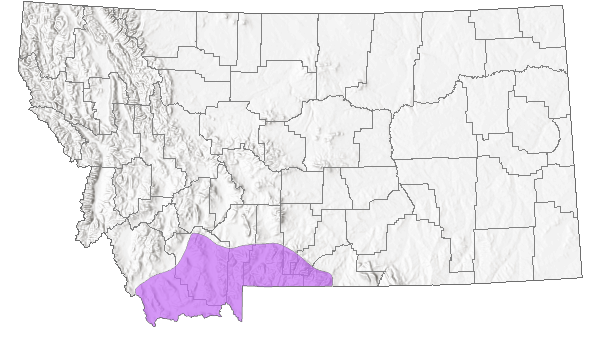
 Native
Native
Range Comments
YT south to UT and CO; known from Madison County (Lesica et al. 2012. Manual of Montana Vascular Plants. BRIT Press. Fort Worth, TX)
Observations in Montana Natural Heritage Program Database
Number of Observations: 5
(Click on the following maps and charts to see full sized version)
Map Help and Descriptions
Relative Density
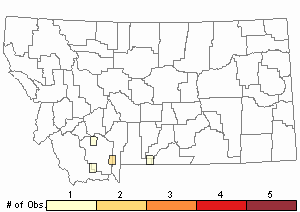
Recency
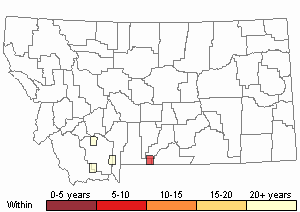
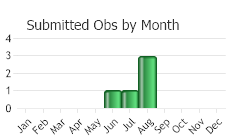
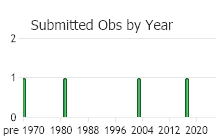
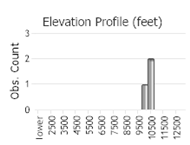 (Observations spanning multiple months or years are excluded from time charts)
(Observations spanning multiple months or years are excluded from time charts)
Habitat
Draba ventosa occurs in scree and shifting talus of slopes near or above treeline, often but not always on limestone parent material. Associated species include Dryas octopetala, Saxifraga oppositifolia, Antennaria aromatica and Draba oligosperma.
National Vegetation Classification System Groups Associated with this Species
Alpine
Alpine - Sparse and Barren
Alpine - Vegetated
Ecology
Draba ventosa occupies habitats with sparse vegetation suggesting that it is not tolerant of competition.
Management
Wind River draba is found in inaccessible high-elevation sites. There are no immediate anthropogenic threats. However, at least one site is in a historic mining district, so mining could pose a threat in the future.
Stewardship Responsibility
Threats or Limiting Factors
STATE THREAT SCORE REASON
Threat impact not assigned because threats are not known (MTNHP Threat Assessment 2021).
References
- Literature Cited AboveLegend:
 View Online Publication
View Online Publication Lesica, P., M.T. Lavin, and P.F. Stickney. 2012. Manual of Montana Vascular Plants. Fort Worth, TX: BRIT Press. viii + 771 p.
Lesica, P., M.T. Lavin, and P.F. Stickney. 2012. Manual of Montana Vascular Plants. Fort Worth, TX: BRIT Press. viii + 771 p. MTNHP Threat Assessment. 2021. State Threat Score Assignment and Assessment of Reported Threats from 2006 to 2021 for State-listed Vascular Plants. Botany Program, Montana Natural Heritage Program, Helena, Montana.
MTNHP Threat Assessment. 2021. State Threat Score Assignment and Assessment of Reported Threats from 2006 to 2021 for State-listed Vascular Plants. Botany Program, Montana Natural Heritage Program, Helena, Montana.
- Additional ReferencesLegend:
 View Online Publication
View Online Publication
Do you know of a citation we're missing? Lesica, P., M.T. Lavin, and P.F. Stickney. 2022. Manual of Montana Vascular Plants, Second Edition. Fort Worth, TX: BRIT Press. viii + 779 p.
Lesica, P., M.T. Lavin, and P.F. Stickney. 2022. Manual of Montana Vascular Plants, Second Edition. Fort Worth, TX: BRIT Press. viii + 779 p. Mulligan, G.A. 1976. The genus Draba in Canada and Alaska: key and summary. Canadian Journal of Botany 54:1386-1393.
Mulligan, G.A. 1976. The genus Draba in Canada and Alaska: key and summary. Canadian Journal of Botany 54:1386-1393. Mulligan, G.A. Cytotaxonomic studies of Draba species of Canada and Alaska: D. Ventosa, D. ruaxes, and D. paysonii. Canadian Journal of Botany 49:1455-1460.
Mulligan, G.A. Cytotaxonomic studies of Draba species of Canada and Alaska: D. Ventosa, D. ruaxes, and D. paysonii. Canadian Journal of Botany 49:1455-1460. Vanderhorst, J.P. 1994. Sensitive plant surveys in the Gallatin National Forest, Montana. Unpublished report to the Gallatin National Forest. Montana Natural Heritage Program, Helena, MT. 54 pp.
Vanderhorst, J.P. 1994. Sensitive plant surveys in the Gallatin National Forest, Montana. Unpublished report to the Gallatin National Forest. Montana Natural Heritage Program, Helena, MT. 54 pp.
- Web Search Engines for Articles on "Wind River Draba"





